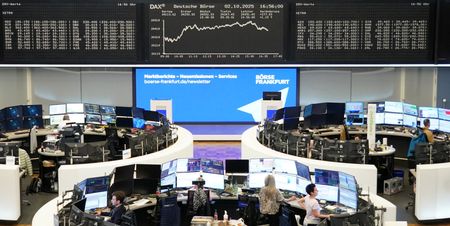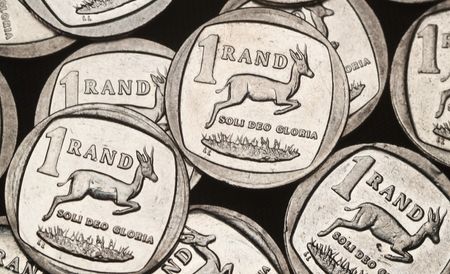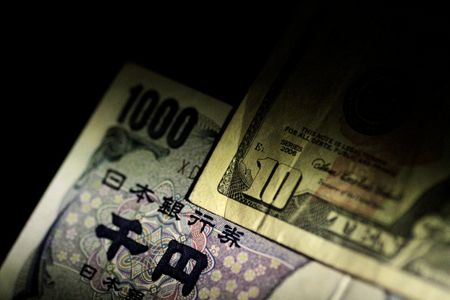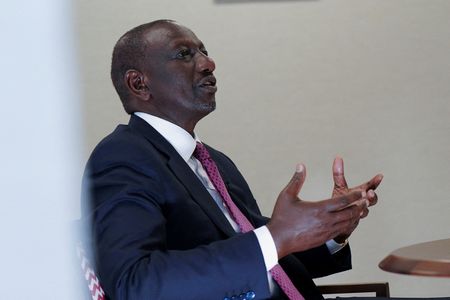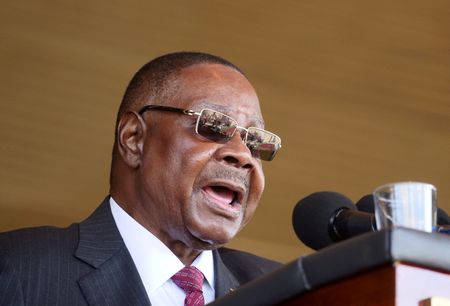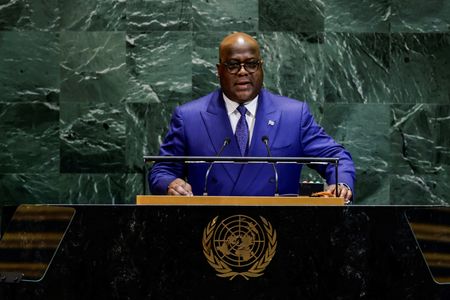By Lucy Raitano and Kevin Buckland
TOKYO/LONDON (Reuters) -Global stocks firmed on Monday after recovering from an earlier rout when the collapse of the French government took markets by surprise, while political developments in Japan lifted Japanese equities but weighed on the yen.
New French Prime Minister Sebastien Lecornu resigned on Monday, barely 14 hours after appointing his cabinet.
At 1150 GMT, the pan-European benchmark STOXX 600 was up 0.13%, but France’s CAC 40 was still down 1.2%, having earlier sunk as much as 2.2%.
U.S. S&P 500 futures firmed 0.3% ahead of the open, with the cash index having risen to a record high on Friday.
TECH SHARES BOOSTED BY AI CHIP DEAL
AI enthusiasm is partly behind the market firmness, with stocks staying near record highs even as a U.S. government shutdown rumbles on. Tech shares in Europe got a small boost after news that AMD has signed an AI chip-supply deal with OpenAI on Monday, and were last up 1.1%.
Market attention stayed on France, with the country’s bank shares hardest hit. BNP Paribas, Societe Generale and Credit Agricole fell between 3.8% and 4.8%.
“The bigger concern for the market is really what comes next, because if Macron decides to appoint another prime minister that’s going to be the sixth PM in two years,” said Michael Brown, senior research strategist at Pepperstone.
Any newcomer would face the same challenging parliamentary arithmetic and problems when trying to pass the budget, said Brown.
French political instability has ramped up since Emmanuel Macron’s re-election in 2022, with no party or grouping holding a parliamentary majority.
The euro slipped 0.6% to $1.1678, and sterling was off 0.33% to $1.3426.
GOLD HITS RECORD HIGH
In Japan, stocks surged more than 5% to an all-time high while the yen skidded on Monday after fiscal and monetary dove Sanae Takaichi was elected as leader of the ruling party, putting her on course to become the nation’s first female prime minister.
Meanwhile, gold climbed to a record peak close to $4,000, while leading cryptocurrency bitcoin rallied to a lifetime high on Sunday, with investors increasingly turning to alternative assets as a store of value as the U.S. government shutdown frayed nerves.
Japan’s Nikkei soared above 48,000 for the first time after Takaichi beat the more moderate Shinjiro Koizumi in the Liberal Democratic Party’s leadership vote on Saturday, stoking expectations for fiscal stimulus.
“Takaichi seems very pro-growth and pro-markets, and that’s been felt in the Japanese equity market this morning … that will put more fuel into Asian equity markets,” said Rory McPherson, CIO at Magnus Financial Discretionary Management.
The yen slumped as much as 2% to beyond 150 per U.S. dollar for the first time since August 1, and slid as much as 1.8% to an all-time low versus the euro at 176.25.
Worries about Japan’s finances sent the yield on 30-year government bonds to an all-time high.
SHORT-DATED JAPANESE GOVERNMENT BOND YIELDS SLIDE
At the same time, short-dated Japanese government bond yields slid to a two-week low as traders pared bets on when the Bank of Japan will resume raising interest rates.
Market-implied odds of a BOJ hike by year-end fell to 41% from 68% on Friday.
A year ago, Takaichi criticised the BOJ’s decision to raise rates as “stupid”, although her recent rhetoric has been more restrained, saying only that central bank policy should be aligned with the government.
“We believe concerns among some investors that the next administration might pursue extreme fiscal expansion or exert political pressure on the BOJ are overblown,” Morgan Stanley MUFG Securities economists wrote in a research report, noting that Takaichi’s stance appears closely aligned with BOJ Governor Kazuo Ueda’s cautious approach to policy normalisation.
Most other major share markets around the region were closed for holidays, including mainland China, South Korea and Taiwan.
Gold last changed hands around $3,936 after advancing as much as 1.5% earlier to a record just above $3,944.
Bitcoin traded around $124,249 following its jump to $125,653.32 on Sunday.
Oil prices rose after OPEC+ announced on Sunday it would increase production by 137,000 barrels per day from November, the same modest monthly increase as in October, amid persistent concerns over a looming supply glut.
In the run-up to the meeting, sources said Russia was advocating an output increase of 137,000 bpd to avoid pressuring prices, but Saudi Arabia would have preferred double, triple or even quadruple that figure to regain market share more quickly.
Brent crude futures gained 0.6% to $64.92 a barrel.
(Reporting by Kevin Buckland in Tokyo and Lucy Raitano in London; Editing by Sam Holmes, Ed Osmond and Alison Williams)

